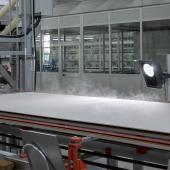Spain: construction sites and factories get back to work
The Castellón ceramic district is reopening after the two weeks of non-essential production activity shutdown imposed by the Sánchez government on 29 March. Construction sites also get the go-ahead
The Castellón ceramic district is returning to work after the two weeks of non-essential production activity shutdown imposed by Decree Law 10/2020 passed by the Sánchez government on 29 March. Rather than extend the shutdown, the government has given the green light to the reopening of construction sites and to the production activities of tile manufacturers and suppliers of machinery, glazes and colours.
Starting on 10 April, but in practice between 13 and 14 April following the Easter weekend, all companies capable of guaranteeing worker safety are allowed to resume operations while continuing to encourage homeworking wherever possible.
The measures laid down by the government and the Ministry of Health include maintaining a distance of 2 metres between workers (but pregnant women and people suffering from chronic illnesses must stay at home), the supply of approved masks and overalls, prevention tests, staggered entry and exit times, constant sanitisation of workplaces, and a ban on people congregating in common areas and changing rooms.
Approval for production activities to proceed to Phase 2 (while the rest of the population remains under lockdown) had been requested urgently by Spanish companies, fearing that the shutdown would be extended as in the case of Italy. It should also be remembered that Spanish companies had already been permitted to continue to ship goods from stock.
In the meantime, on 12 April the Spanish tile manufacturers’ association ASCER, led by Chairman Vicente Nomdedeu, and the unions ratified a document (“Continuity Plan for the SARS-CoV-2 coronavirus”) drawn up by the UNIMAT Prevention Service in accordance with indications provided by the Ministry of Health, to be applied to the ceramic tile manufacturing industry: a compendium of all the measures already implemented or in any case to be adopted by companies in the sector to ensure worker health and risk prevention in anticipation of the resumption of activity.
- In the ceramic sector the return to work will be gradual
“The return to work will be very gradual, given the freefall in demand in recent weeks.” This was the comment made by ASCER, which on 3 April was already calculating a 60% drop in orders in the first week of lockdown and a decline of more than 80% in the domestic market.
According to the association, the resumption of production activities will not mean an immediate return to normality, which instead will take several months and will be conditional upon a recovery in demand from domestic and foreign customers. The main markets for Spanish tiles are the domestic market (25%), Europe and the United States, in other words the areas that have been worst hit by the pandemic and have experienced the strictest measures to contain the spread of Covid-19.
“We are facing a global pandemic that has led to a contraction in demand all over the world,” continues the ASCER statement, “not to mention the fact that our sector is threatened in international markets by foreign producers who have not had to halt their production activities.”
The go-ahead for the resumption of construction work in Spain (excluding renovation work in occupied housing) is a real shot in the arm for the ceramic industry.
Another source of major concern for the Spanish ceramic industry is company liquidity. ASCER has urgently called on the government to provide direct liquidity for companies (for example by deferring tax payments and VAT advances) to avoid the complete breakdown of the productive, entrepreneurial and social fabric.
In 2019, the Spanish ceramic tile industry recorded sales of 3,740 million euros with a workforce of over 15,000 direct employees.
- The machinery sector
Most ceramic machinery manufacturers in the Castellón area are also returning to work on 14 April. Some had already partially resumed operations last week, either to carry out maintenance or to dispatch foreign shipments, or from Friday 10 April to provide technical support with kiln start-up for companies looking to resume production during the holiday weekend.
- Glaze and colour producers get back to work

Joaquín Font de Mora, chairman of ANFFECC The Spanish glaze and colour factories are likewise seeing a gradual return to work as they grapple with the fall in orders.
According to the association of Spanish frit, glaze and ceramic colour producers Anffecc, the pace will be dictated by the way in which demand for materials evolves during the course of the month. For example, Fritta is planning to restart at 50% of production in an initial period, with half of its staff on leave each week.
As the association’s chairman Joaquín Font De Mora explained, it was a real necessity for ceramic glaze and colour factories to resume production, even if it was not at full capacity, as these kinds of products can only be stored in very limited quantities. Moreover, the fact that companies were allowed to continue to ship orders to foreign customers during the last two weeks meant they were able to maintain minimum invoicing levels, but stocks had now run out and were only sufficient to fulfil orders for a few more days. Any extension of the shutdown beyond 10 April would have been disastrous.
Did you find this article useful?
Join the CWW community to receive the most important news from the global ceramic industry every two weeks




















